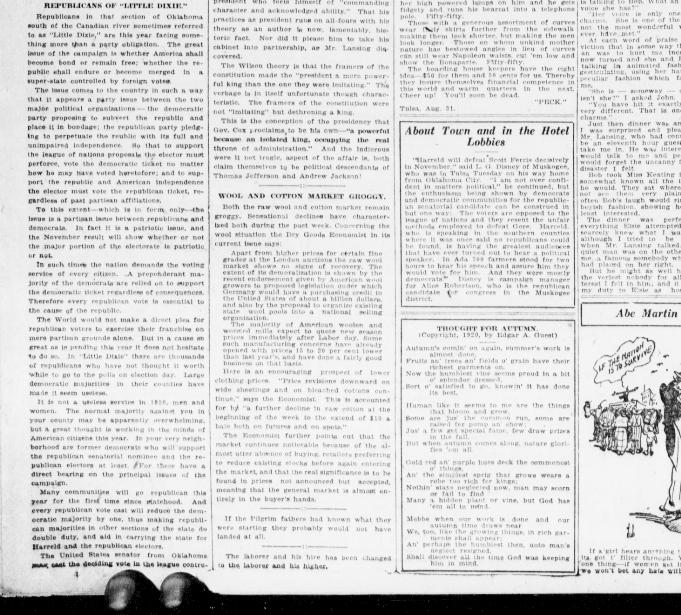|
Moderated by NW Okie! |
Volume 16 , Issue 332014Weekly eZine: (374 subscribers)Subscribe | Unsubscribe Using Desktop... |
1920, Republicans of Little Dixie

8 September 1920, The Morning Tulsa Daily World, page 4, reported on a vote of the League Nation supporters and Democratic and Republican candidates for and against it. Democratic voters were encouraged to vote for the League of Nations, while the Republicans were encouraging their voters to vote against the League of Nations.
It was reported in 1920, The Morning Tulsa Daily World, that the republicans of "Little Dixie" in that section of Oklahoma south of the Canadian River sometimes referred to as "Little Dixie," were in 1920 facing something more than a party obligation. The great issue of the campaign was whether America shall become bondage or remain free; whether the republic shall endure or become merged in a super-state controlled by foreign votes.
This issue came to the country in a way that it appeared a party issue between the two major political organizations - Democratic party proposing to subvert the republic and place it in bondage; the republican party pledging to perpetuate the republic with its full and unimpaired independence. So that to support the league of nations proposals the elector must perforce, vote the democratic ticket no matter how he may have voted heretofore; and to support the republic and American independence the elector must vote the republican ticket, regardless of past partisan affiliations.
The issue was a partisan issue between republicans and democrats. In fact, it was a patriotic issue, and the November 1920 result would show whether or not the major portion of the electorate was patriotic or not.
It was in such times the nation demanded the voting service of every citizen. A preponderant majority of the democrats were relied on to support the democratic ticket regardless of consequences. Therefore, every republican vote was essential to the cause of the republic.
The World would not make a direct plea for republican voters to exercise their franchise on mere partisan grounds alone. But in a cause so great as is pending the year of 1920, it did not hesitate to do so. In "Little Dixie" there were thousands of republicans who had not thought it worth while to go to the polls on election day. Large democratic majorities in their counties had made it seem useless.
It was not a useless service in 1920, men and women. The normal majority against you in your county may be apparently overwhelming, but a great thought was working in the minds of American citizens that year. In their neighborhoods were former democrats who would support the republican senatorial nominee and the republican electors at least. For these had a direct bearing on the principal issues of the campaign.
Many communities would go republican that year for the first time since statehood. And every republican vote cast would reduce the democratic majority by one, thus making republican majorities in other sections of the state do double duty, and aid in carrying the state for Harreld and the republican electors.
The United States senator from Oklahoma may cast the deciding vote in the league controversy. It was of capital importance that he cast that vote for the republic, not against it. Harreld would do this. Ferris would not. He was pledged to European domination.
The republican voter in "Little Dixie" may have been the only one in his precinct. He should get to the polls on election day. His vote would do splendid service towards preserving American government. If every republican resident in "Little Dixie" voted November 2, 1920, Harreld would be the next senator from Oklahoma and Harding and Coolidge would carry the state of Oklahoma. On that forecast back in 1920 they pledged themselves.
| View or Add Comments (0 Comments)
| Receive
updates ( subscribers) |
Unsubscribe
| © . Linda Mcgill Wagner - began © 1999 Contact Me | |
